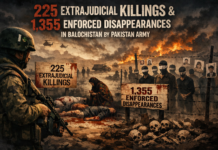Toronto: It’s almost three years since prominent Baloch woman activist Karima Baloch was killed here, suspectedly by Pakistan’s notorious intelligence agency ISI, but justice is yet to be done by the country where she had sought refuge and protection.
Karima, former Chairperson of Baloch Students Organisation (Azad), was last seen on December 20, 2020 at around 3 PM at Bay Street and Queens Quay West area in Toronto and two days later, she was found dead near the Ontario Lake in mysterious circumstances.
In her 30s, the activist who was named as one of the world’s 100 most “inspirational and influential” women in 2016 by the BBC, had come to Canada to escape the wrath of Pakistani military and its agencies, especially ISI (Inter-Services Intelligence).
Canada, which claims to be a champion of human rights, has failed to deliver justice to Karima despite being aware that she had fled Pakistan because she was facing threat to her life from the Pakistani state agencies.
The Canadian Police or any other authority has not come out with any convincing explanation about the cause or circumstances in which Karima died.
The Baloch people feel they have been failed by Canada and its Government as such a serious matter was not investigated properly and thoroughly, because of “electoral considerations”.
Displaying this feeling, a Canada-based Baloch human rights body has communicated to Prime Minister Justin Trudeau its disappointment over the manner in which Karima’s death or possible killing has been treated.
Zaffar Baloch, President of Baloch Human Rights Council of Canada (BHRC-Canada), in a letter to Trudeau has expressed “deep concern regarding the Canadian Government’s perceived inconsistencies in its response to the mysterious death” of Karima who was supposed to be a “protected individual” here.
“Karima Baloch’s untimely death, shrouded in suspicion, was swiftly and definitively concluded by the Toronto Police within forty-eight hours of the discovery, with an announcement that ‘no foul play was suspected’,” he wrote.
Zaffar Baloch said “both the government of Canada and the Toronto Police were well-informed about the grave death threats” that Karima had received from the ISI, yet they maintained silence on this matter.
“PM Justin Trudeau and his Liberal Party Government must provide a transparent and just response regarding the quest for justice in case of Ms Karima Baloch,” he said.
He highlighted contrast in the approaches adopted by Trudeau in the cases of Karima, who was a prominent human rights defender, and that of Hardeep Singh Nijjar, a Khalistani activist who propagated violence and terror.
Trudeau’s “conspicuous silence regarding the high-profile, unexplained death” of Karima, “who was a prominent human rights defender, stands in stark contrast to his impassioned speeches in the House of Commons and extensive international media coverage regarding the shooting death of Mr Hardeep Singh Nijjar in Canada,” the leader of BHRC-Canada said.
He was apparently referring to Trudeau’s act of raising hue and cry over the killing of Nijjar by some unknown gunmen in June this year, while being silent on the death of Karima.
Trudeau has proclaimed that there were “credible allegations” about involvement of Indian agencies in the murder of Nijjar, a charge rubbished by the Government of India.
“This discrepancy raises concerns about the Canadian Government’s consistency and fairness, particularly with regard to its handling of Balochistan’s ongoing human rights violations by the Pakistan Army,” Zaffar Baloch added.
Talking about Karima who was instrumental in highlighting at international fora the plight of Baloch people under the repressive rule of Pakistan, he said she dedicated her life to advocating for the rights and freedom of Balochistan from tyranny and Pakistani military occupation.
“It is our firm belief that the Canadian government must treat all individuals equally, without regard to race, creed or political contributions,” Zaffar Baloch said.
He lamented that “the appeals over the past two years appear to have gone unnoticed, possibly due to electoral considerations.”
He said BHRC-Canada believes that the Canadian Government’s “apparent reluctance” to address Karima’s death impartially may be linked to electoral considerations.
“The Baloch community in Canada is relatively small and lacks the electoral influence to significantly impact the selection of representatives in Parliament,” he said.







